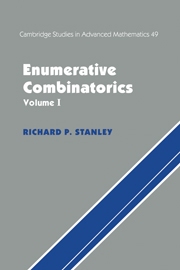Preface
Published online by Cambridge University Press: 05 June 2012
Summary
Enumerative combinatorics is concerned with counting the number of elements of a finite set S. This definition, as it stands, tells us little about the subject since virtually any mathematical problem can be cast in these terms. In a genuine enumerative problem, the elements of S will usually have a rather simple combinatorial definition and very little additional structure. It will be clear that S has many elements, and the main issue will be to count (or estimate) them all and not, for example, to find a particular element. Of course there are many variants of this basic problem that also belong to enumerative combinatorics and that will appear throughout this book.
There has been an explosive growth in combinatorics in recent years, including enumerative combinatorics. One important reason for this growth has been the fundamental role that combinatorics plays as a tool in computer science and related areas. A further reason has been the prodigious effort, inaugurated by G.-C. Rota around 1964, to bring coherence and unity to the discipline of combinatorics, particularly enumeration, and to incorporate it into the mainstream of contemporary mathematics. Enumerative combinatorics has been greatly elucidated by this effort, as has its role in such areas of mathematics as finite group theory, representation theory, commutative algebra, algebraic geometry, and algebraic topology.
This book has three intended audiences and serves three different purposes. First, it may be used as a graduate-level introduction to a fascinating area of mathematics.
Information
- Type
- Chapter
- Information
- Enumerative Combinatorics , pp. vii - viiiPublisher: Cambridge University PressPrint publication year: 1997
